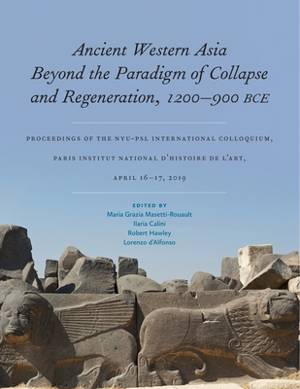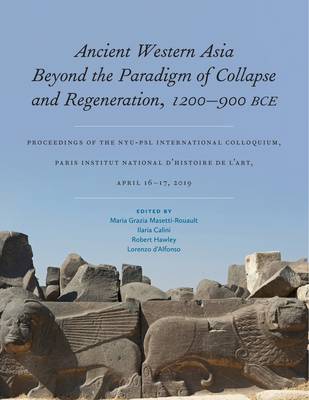
- Afhalen na 1 uur in een winkel met voorraad
- Gratis thuislevering in België vanaf € 30
- Ruim aanbod met 7 miljoen producten
- Afhalen na 1 uur in een winkel met voorraad
- Gratis thuislevering in België vanaf € 30
- Ruim aanbod met 7 miljoen producten
Zoeken
Ancient Western Asia Beyond the Paradigm of Collapse and Regeneration (1200-900 Bce)
Proceedings of the Nyu-Psl International Colloquium, Paris Institut National d'Histoire de l'Art, April 16-17, 2019
€ 144,45
+ 288 punten
Omschrijving
New results and interpretations challenging the notion of a uniform, macroregional collapse throughout the Late Bronze Age Eastern Mediterranean
Ancient Western Asia Beyond the Paradigm of Collapse and Regeneration (1200-900 BCE) presents select essays originating in a two-year research collaboration between New York University and Paris Sciences et Lettres. The contributions here offer new results and interpretations of the processes and outcomes of the transition from the Late Bronze Age to the Iron Age in three broad regions: Anatolia, northern Mesopotamia, and the Levant. Together, these challenge the notion of a uniform, macroregional collapse throughout the Eastern Mediterranean, followed by the regeneration of political powers. Current research on newly discovered or reinterpreted textual and material evidence from Western Asia instead suggests that this transition was characterized by a diversity of local responses emerging from diverse environmental settings and culture complexes, as evident in the case studies collected here in history, archaeology, and art history. The editors avoid particularism by adopting a regional organization, with the aim of identifying and tracing similar processes and outcomes emerging locally across the three regions. Ultimately, this volume reimagines the Late Bronze-Iron Age transition as the emergence of a set of recursive processes and outcomes nested firmly in the local cultural interactions of western Asia before the beginning of the new, unifying era of Assyrian imperialism.Specificaties
Betrokkenen
- Uitgeverij:
Inhoud
- Aantal bladzijden:
- 640
- Taal:
- Engels
- Reeks:
- Reeksnummer:
- nr. 22
Eigenschappen
- Productcode (EAN):
- 9781479834624
- Verschijningsdatum:
- 7/05/2024
- Uitvoering:
- Hardcover
- Formaat:
- Genaaid
- Afmetingen:
- 216 mm x 279 mm
- Gewicht:
- 2331 g

Alleen bij Standaard Boekhandel
+ 288 punten op je klantenkaart van Standaard Boekhandel
Beoordelingen
We publiceren alleen reviews die voldoen aan de voorwaarden voor reviews. Bekijk onze voorwaarden voor reviews.










